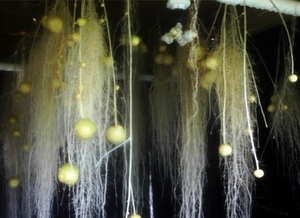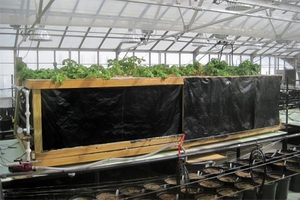For the past three years, Keith Perry, associate professor of plant pathology and plant-microbe biology and director of the New York State Foundation Seed Potato Program and the Uihlein Farm in Lake Placid, N.Y., has been working with farm manager Chris Nobles on a novel “aeroponics” system that shows great promise for enhancing potato propagation in New York.


The golden nematode, one of the world’s most damaging potato pests, can remain dormant in soil for up to 30 years. To control the pest, Cornell breeders have developed 22 nematode-resistant potato varieties. Walter de Jong, associate professor of plant breeding and genetics, conducts most of that research, and associate professor of horticulture Donald Halseth evaluates the new varieties. They also work with virologist Keith Perry and USDA molecular biologist Xiaohong Wang to understand and test for the nematode.
“With plants, you don’t cure the patient; your main goal is to prevent the disease. The only tool we have is resistance,” Perry said. “Golden nematode is present on thousands of acres in New York, but we have been able to keep the population under control because it cannot reproduce and we have prevented it from spreading.
The process has been a huge success,” Perry added. “Losses from diseases have plummeted. We’ve gotten rid of pathogens that used to affect whole farms.”
“We will be able to get growers more of what growers want, in a shorter turnaround time,” Perry said. “We will be able to get new varieties into the marketplace faster.”





